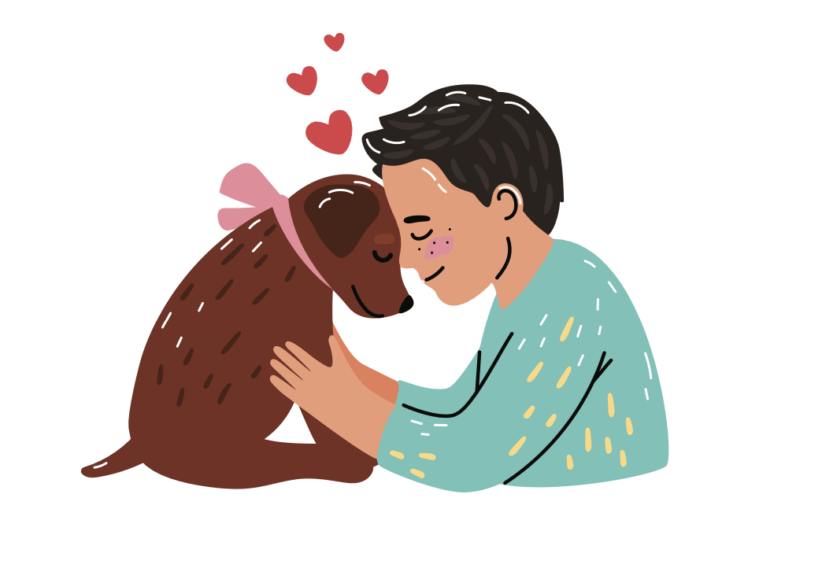
How to Find the Perfect Dog for Special Needs Families
Pets can add a lot of love to our lives, and they can be especially beneficial for special needs families. Dogs, in particular, can help your child with special needs develop their social and emotional learning, motor skills, and more.
But choosing a dog can be a stressful process: next thing you know, you’ll be researching for hours, trying to find the perfect dog breed for your family. That’s why, we chatted with Kelly DiCicco, Manager of Adoptions Promotions at the American Society for the Prevention of Cruelty to Animals (ASPCA) Adoption Center to give you all the information you need to find your dream dog. Read on to learn the best tips and tricks for welcoming a furry friend to your special needs family!
Before we jump into the advice, let’s first talk about what makes dogs special. Cats, hamsters, fish, and other animals can certainly be less work, so why adopt a dog? “The companionship and joy that dogs provide can be a wonderful addition to any home,” said DiCicco. For special needs kids, this emotional support and positivity that dogs uniquely emulate will help them grow and develop.
Dogs offer comfort and stability that makes kids with developmental disabilities feel safe and calm. While you can definitely look into trained service dogs, these are often a pretty expensive option for families. So if you’re looking for a more affordable way to add a furry friend to your lives, check out our advice for navigating the pet-finding process.
Adopt from a Shelter or Rescue Organization
You may be wondering if shelter dogs are suitable for kids with special needs, and the answer is: yes! There are even pros of going to a shelter or rescue organization: “When adopting from a shelter or rescue organization, you often have the advantage of learning valuable information about the animal’s background, including any important medical or behavioral needs, and who their ideal adopter might be, including how they would get along with children,” said DiCicco. “Some shelters even have animal behavior counselors you can speak with to determine which dog would be a good fit for your household.” You will receive personalized attention at shelters to find the perfect dog for your family.
Moreover, you’ll be doing something good that your family can feel proud of. “Adopting an animal from a local shelter saves more than one life. Adoption not only moves an animal from vulnerability to safety, but creates space at the shelter, and moves more resources and attention to the remaining animals,” said DiCicco.
Psst… Check out An Expert Weighs in on Effects of Children Using Social Media
Don’t do too much research
Isn’t it best to be over prepared as a parent? Well, in this case, no. If you do too much research beforehand, you may develop too concrete of an idea and miss out on getting to know adorable and fitting dogs for your family.
“We encourage adopters to keep an open mind and heart when considering animals from a shelter in case you find the right chemistry with a pet you’d never considered before, like a senior animal or even those of a different breed, size or species,” said DiCicco.
And worst case scenario you were already prepared for a certain kind of dog, but your family ends up choosing another, shelters have resources in place to provide you with all the information you need about the dog you chose. “If you end up adopting a species of animal that is different from the kind of pet you initially considered, the staff at the shelter can share information on the appropriate care and time commitment needed for the specific pet,” added DiCicco.
Attend a Meet-and-Greet
It kind of goes without saying that meeting dogs in person is a must for adopting. You’ll actually get to interact with the dogs and see how they play with your kiddos. The best part about the in-person search is that you’ll have the expertise of the shelter on your side to help you make decisions. “Meeting a potential pet in person during a meet-and-greet session with the help of staff at the shelter can be a great way to get a sense if the dog is the right fit for your family and lifestyle,” said DiCicco.
Meet-and-greets are often more telling than online research about dog breeds. Sure, there are some dog breeds that are known to be great for kids with special needs like Golden Retrievers. But DiCicco recommends that you pay attention to the dog’s personality and your family’s daily habits more than their breed: “Every animal—even those within a specific breed—has an individual personality and disposition. Ask questions and lean on the staff at the shelter for guidance—they’re the experts at making matches and can typically provide information to help you decide whether or not the animal you’re interested in is a good fit for the specific needs of your family. Your personality and lifestyle, along with the amount of time spent away from home, should also be explored to determine what pet is right for your household.”
Don’t Discount Older Dogs
You may be inclined to only look at puppies– I mean, it is hard to resist those cute little eyes and excited energy. But there are a few benefits to adopting an older dog for families with special needs. “Raising puppies properly takes a lot of time and hard work, while most adult and senior dogs have more established personalities, manageable energy levels and may have mastered basic commands,” said DiCicco.
As many of us know, raising a kid with special needs can be very time-consuming. Between school meetings, doctor’s appointments, therapy, and after-school programs, adding a newborn puppy to the mix may make it difficult to manage. If you don’t have a ton of time in your schedule but still want to adopt a dog, older dogs may be a better fit than puppies.
Older dogs may not be as energetic as puppies, but again, every dog has a special personality. Your kids may just meet an older dog at the shelter that they have an instant connection with. “When you’re looking for a new pet and you get the opportunity to interact with an adult or senior dog at a shelter, you may appreciate being able to know the dog’s size, energy level and personality,” added DiCicco.
Consider Fostering A Dog
Another option you may not have considered is fostering. “If you ultimately determine that now is not the best time to adopt a dog, temporarily fostering can give you the opportunity to single-handedly change an animal’s life for the better and is a rewarding experience for those who choose to become caregivers,” said DiCicco.
The one con to fostering is that your family will eventually have to give the dog up, and parting with a pet can be a troubling experience for kids with special needs. However, you can potentially adopt the pet yourself after fostering, if you’re ready. You can also start fostering a new dog soon after the other dog leaves your home.
If you do decide to foster a dog, you will be fully supported. “Many shelters across the country provide training, resources, and materials to prepare you for a foster animal. The time required for fostering ranges from a couple of weeks to several months, depending on the animal’s needs,” said DiCicco.
Align on Daily Responsibilities
Whether you foster or adopt, choose a puppy or older dog, adding a pet to your life will require time and effort. “When preparing to adopt, it is a good idea to draw up a schedule of who in the family will help with the care of your new pet,” said DiCicco, “including playing, feeding, grooming—and taking the dog out for walks.” Giving small tasks to your child with special needs, such as filling your dog’s food bowl, can build self-confidence and leadership skills.
Make Sure Everyone in your Family is Happy
Choosing to adopt a dog is a family decision, so have an open conversation to check in and hear everyone’s thoughts. Especially if you have multiple kids, make sure you bring them to the meet-and-greet so that they all can feel included in the process.
Of course it’s hard to please everyone, and there may be disagreements here and there, but at the end of the day, the dog you choose should be one that everyone gets along with. This will make it easier when you actually get into the day-to-day life of owning a dog: “The entire family should be on board and willing to welcome the pet into the home,” said DiCicco.
Welcoming a furry friend to your family is very exciting, so enjoy the process and lean on support systems, like shelter staff, to make your decision. Good luck in your pet-finding search!






















